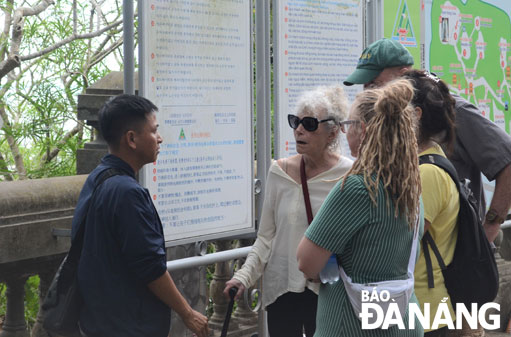Da Nang tourism faces staff shortages for post-pandemic recovery
Since Da Nang braced for a first wave of coronavirus infections in April, many hospitality workers have been laid-off or furloughed during the city’s lockdown restrictions.
 |
| A picture taken in December 2019 showing an international tour guide (left) guiding tourists at the Marble Mountains tourist area |
Tourism experts have warned of a severe shortage of staff in Da Nang tourism industry for a post-pandemic recovery because the unpaid lay-offs were forced to find other livelihoods to make ends meet during the challenging times triggered by the pandemic.
Statistics released by the Da Nang Labour Union show that, since a second wave of coronavirus infections hit Da Nang in late July, more than 56,000 people have lost their jobs across the city, including 44,000 hospitality workers, nearly double the figure recorded in a first wave of the virus in Da Nang in April.
As tourism is the most heavily affected sector by the pandemic, its staff are currently struggling financially in their lives, and they are now looking forwards receiving timely support from the municipal and national governments.
According to Vice Chairman of the municipal Hotels’ Association cum General Director of the Furama Da Nang Resort Nguyen Duc Quynh, the prolonged Covid-19 pandemic caused a large number of hotels across the city to close either permanently or temporarily.
In reality, 95% of hotel staff have been laid off, and many of them enjoyed either unemployment benefits or the national government’s financial grants.
During the virus resurgence, many hospitality workers were asked to take unpaid leave as their companies’ revenue was considerably diminished by the pandemic.
They had no choice but to earn a new living to secure their income after losing their jobs. For instance, some had to turn to run online shops to get thorough their financially difficult times, others rely on unstable jobs to ‘fill their rice bowls at home’.
Tour guides were out of work after a second wave of the virus starting raged Da Nang in late July, many of whom actively switched to other careers to make a living.
Meanwhile, 60% of staff in private tourist sites were laid off due to the pandemic, and the remainder remained employed to get involved in property maintenance, cleanups and landscape care tasks here.
Till date, only 10 – 15 % of the city’s total serviced accommodation establishments have reopened.
According to Deputy Director of the municipal Department of Tourism Nguyen Xuan Binh, the tourism industry is urging the municipal government to offer funding to provide training courses in knowledge and skills for its staff in a bid to revive it for a post-pandemic recovery.
Besides, it is recommended that the national government and other functional ministries and agencies facilitate hospitality staff to have better access to preferential and support policies.
To reboot the flow and growth that Da Nang tourism sector has enjoyed over the past years may take more time. At present, Viet Nam still closes its doors to international visitors.
By NHAT HA – Translated by A.T